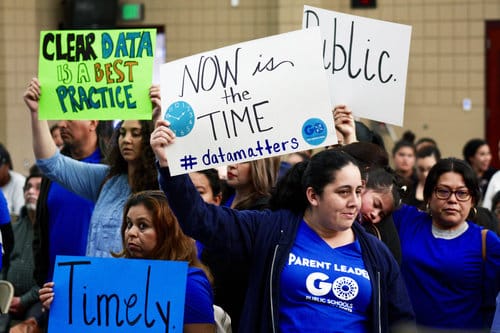IMPORTANCE AND COMPLEXITY
Why is measurement important to parent empowerment?

Measurement is the act of collecting data to help an organization make decisions to maximize its impact.
Organizations and leaders in the parent empowerment space are incredibly and passionately results-driven.
However, results-driven does not necessarily mean measurement-driven. Caring deeply about impact is not the same as developing clarity on how to measure impact.
Many organizations providing direct education services (school models, out-of-school programming, etc.) have taken the formidable journey from being results-driven to measurement-driven to more fully unlock their potential (and at scale). Taking this journey is an equally important need and opportunity for those in the parent empowerment space.
"Measurement isn’t about bean-counting, but about honest, genuine attempts to understand if programming is really having the intended impact we want for students, parents and communities.”
— Mina Kumar
Chief Program Officer
Families Empowered
For practitioners of this work, developing more clarity on when and how to use measurement unlocks value in:
- Planning parent empowerment campaigns.
- Effectively executing these campaigns.
- Learning and sharing – both in the midst of a campaign and between campaigns.
- Engaging and rallying allies and resources.
And all of these activities help organizations successfully grow in size and complexity.
Many funders are also seeking to deepen their understanding of measurement in parent empowerment. Funders are as results-driven as practitioners. They are also accountable to their boards and stakeholders for results. A lack of clarity on measurement can be an obstacle for funders in building more support for this work within their organization.
Developing a more sophisticated approach to measurement would help funders in:
- Understanding the impact of the work they are funding in parent empowerment.
- Learning alongside their grantees about what works and why (and also what does not work and why) – and which investments and programming lead to success.
- Unlocking more funding.
- Better structuring that funding (i.e., timeframe of funding, funding for building infrastructure, etc.).
Knowing how to measure what matters ultimately creates stronger social contracts between practitioners and funders in service of impact.
“Most funding is designed to be short-term and project-based, which makes long-term planning a challenge. But by introducing measures we believe are important, including about building an organization’s long-term capacity, practitioners not only challenge themselves but also bring funders on board to think strategically and as long-term partners.”
— David Park
SVP of Strategy and Communications
Learning Heroes
Why is measurement so complicated in parent empowerment?
Measurement is seldom easy. Even within schools and nonprofit direct-service providers, what might seem straightforward on its surface gets complicated very quickly. Organizations need to distinguish inputs from outputs from outcomes. Organizations need to set targets. They need to decide what student outcomes they are looking to impact and how they can link their work to determining if they have created (or at least contributed to) this impact. And they need the data systems, work processes, talent, training, and cultural mindset to capture and then use measurement to manage and maximize results.
Measurement usually requires laying out a ‘wiring diagram’ of a series of actions/events and corresponding measures that impact each other sequentially over time, usually (but not always) in a linear direction and building in importance. This is also what we commonly see in an organization’s articulation of their logic model, also sometimes called an intended impact/theory of change (or theory of action).
Parent empowerment work has to navigate not only all of above complexity, but also its own unique complexity around measurement:
- Parent empowerment requires measuring concepts like relationships, leadership, and power.
- Parent empowerment efforts are frequently non-linear. Many parent empowerment campaigns include a complex choreography of many actions in which parents participate. But not every individual may participate in the same actions. Some actions happen in parallel while others happen in sequence. Some actions may need to be repeated. Sometimes achieving an impact agenda can require multiple campaign cycles, and/or multiple types of campaigns (i.e., electoral to policy to implementation to public adoption).
- Sometimes parents are actors, while other times they are recipients of actions – and both are measures of an organization’s power. For example:
- A parent trained in canvassing is a recipient of programming. But when they then actively canvass, they are an actor.
- The individuals that a parent meets with and talks to in canvassing are recipients of a canvassing action. However, if they then sign up with an organization to be a subscriber or sign a petition or agree to be an active member and take an action, they are now themselves actors.
- Even the word ‘action’ can mean different things. Sometimes it refers to an individual’s action, while other times it refers to a larger collective action – which is itself measured by the number of individuals who took action in support of that larger effort.
- A key set of measures in parent empowerment are quantifying an organization’s infrastructure of parent power, which can include parents in multiple roles and is an ongoing, dynamic set of measures that exist both during and between campaigns.
In other words, it’s complicated.
Measurement is about quality, not quantity (though it is about quantifying)
While measurement is vital to creating value, no organization can or should measure everything.
Measurement also doesn’t happen for the sake of measurement. It happens because it is in service of an impact agenda – a change in practice or a change in policy (as a step toward practice) that is meant to improve student outcomes.
There are a vast and easily overwhelming number of data points an organization can measure.
Every act of measurement comes with a cost – be it in staff time, systems costs, and/or expending relationship capital with those who are involved in a measure.
And measuring the wrong things can be a strategic distraction.
“Not everything that counts can be counted, and not everything that can be counted counts. We are measurement-driven, but we also have to be reasonable about what an organization our size can track.”
— Sierra Jenkins
VP of Research, Policy and Communications
Innovate Public Schools
Every organization should ‘Goldilocks’ what it measures. You should only capture measures that help your organization make better decisions to increase impact (and are practical to collect).
Across each of these four parent empowerment strategies, an organization should first define its impact agenda and how it will measure success. Then it should plan backwards, determining at each step of a campaign what it will measure and where it will set targets that it believes are necessary in order to succeed. An organization then uses those measures to manage execution and to determine at key steps during its campaign if it is on track to succeed (and if it is not, how it nimbly responds).
Measurement may also evolve over time as an organization expands into new strategies and new actions, or achieves a level of scale and complexity that benefits from further formalizing what it measures.

Measurement is in service of people and relationships
It is important to acknowledge that this work is ultimately about people, not numbers.
At the core of this work are students who want the full opportunity to realize their best destinies, and their parents’ hopes and fears about that opportunity being granted or denied.
Our emphasis on measurement is also not a substitute for relationships. Rather, measurement is about being able to understand the quality and quantity of relationships your organization has built and the willingness of the parents you have relationships with to work with you to exercise their power to advance a common agenda.
225 Franklin Street, Suite 350
Boston, MA 02110
617.912.8800
This work is licensed under a Creative Commons Attribution-NonCommercial-ShareAlike 2.0 License (CC BY-NC-SA 2.0)
Click Here to learn more.

